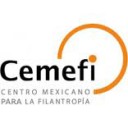In 2004, Cemefi created the Institutionalization and Transparency Standards (ITSs) to increase transparency and accountability in civil society organizations (CSOs). A clear and transparent use of resources builds trust in organizations, facilitates strategic partnerships and increases grants and high-impact social investment.
ITSs are a set of ten objective, non-controversial and easily verifiable references that reflect the level of institutional development of the organization, and enable any person, corporation or institution to know with certainty some of the characteristics of a private, non-profit and of services to others, organization. This resource works as a voluntary institutional process of self-assessment and self-regulation Cemefi credits through documentary evidence.
(Translation: Basic: 1. Charter signed by a notary, 2. Authorized by the Ministry of Finance and Public Credit; 3. Mission, vision and objectives; 4. Verifiable address and telephone; 5. Annual report of activities and results. Medium: 6. Board separate from professional team; 7. Professional staff on the payroll; 8. Volunteers working in the teams. Ideal: 9. More than three years in operation; 10. More than three different sources of income.)
In the first half of 2012, there was a survey of the nearly 500 credited CSOs that have reached an optimal level in the Institutionalization and Transparency Standards, along with a group of corporations and corporate foundations, in order to know their opinion about the usefulness of this tool.
Results show there are many benefits for both polled groups – civil society organizations and grantmakers alike.
Nearly 85 per cent of certified organizations answered that the accreditation increased the level of confidence of their grantmakers, board members and beneficiaries of the institution. Sixty-five per cent managed to increase received grants implementing new fundraising strategies, strengthening their boards and operative teams as a result of increasing the visibility of the institution, contacting new grantmakers and redefining their strategic lines, programs and communication tools.
For participant CSOs, the accreditation process constitutes an empowerment tool that allows them to spot areas of opportunity to improve their institutional management. It is also a valuable element for increasing the visibility of organizations, leading them to improve their position with stakeholders, and increasing the possibility of finding more grantmakers and more substantial grants.
As for polled grantmakers (either corporations or corporate foundations), 80 per cent answered that the Institutionalization and Transparency Standards are a point of reference when choosing their grantees. All of them use at least three of the standards and 60 per cent request that their grantee meet at least the basic standards to be eligible for their granting programs.
Seventy per cent answered that the accreditation increases the reliability of the organization. Sixty per cent considers ITSs to be a diagnostic tool to spot areas of opportunity in institutions and have included them in their empowerment programs for grantees. In addition, the standards have contributed in positioning grantees in the community by making known the results and impact of the projects they support.
From Cemefi we share the results of this survey with followers of Latest from Alliance in order to pose a question: How can creating standards contribute to the performance and professionalization of civil society organizations around the globe? We invite you to reflect on this topic and we hope you will share your own experiences with us.
Lourdes Sanz Moguel is effectiveness and transparency director of Cemefi







Comments (0)